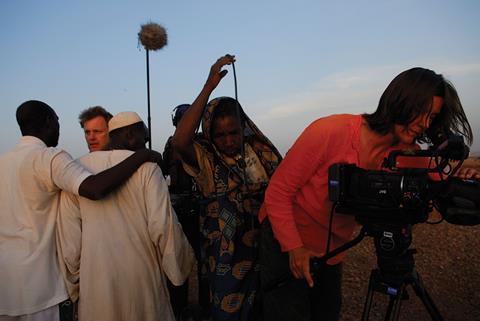Kirsten Johnson is an acclaimed documentary cinematographer who has travelled the globe for 25 years with leading documentary film-makers including Laura Poitras and Michael Moore.

The many subjects she has covered range from Bosnian genocide to impoverished Nigerian maternity wards to Edward Snowden (she was DoP on Citizenfour), which she shows in a succession of impactful clips in her own documentary, Cameraperson.
When the film held its European premiere on Saturday (June 11) at Sheffield Doc/Fest, Michael Moore paid a surprise visit, telling the audience that Johnson is more of a “co-director whose work boldly address ethics in journalism, something even I struggle with”.
Johnson spoke to Screen while she was in Sheffield.
Why did you decide to make Cameraperson?
I was starting to forget things. I couldn’t remember what happened to me the day before. Maybe this was a result of filming, and always having to think of the immediacy of now. But this was a concern, as I had just dealt with all the emotions of my mother having Alzheimer’s disease.
I had also been working on a film for three years set in Afghanistan. When the subject decided she didn’t want to be a part of the film, the project collapsed.
Those extreme cases made me think of the moments over the course of my career, and how filming changes your relationship to memory due to trauma, and to what extent my filming was affecting other people’s trauma.
The film starts off fairly light-hearted but as it progresses, the more troubling issues you are covering emerge. Why did you structure it in that way?
My editor [Nels Bangerter] and I wanted the film to sneak up on people like how these circumstances snuck up on me. I remember thinking when I started filming, “This is so cool, I get to travel the world and cover interesting issues.”
And then you think, “That was intense, but let me do some more [filming].” And all of a sudden, boom, you hit a wall. That’s what I wanted these images to express.
Can you discuss the ethical issues that you gradually build to in the film?
The ethical issues change all the time. You get so involved in these people’s lives and their stories. You feel responsible, and when you are there, you often do get involved. If I see someone needs a bag of blood, there’s a bag of blood.
But then you have to think about that impact when you’re gone. People hear you are helpful, and they start coming from far and wide for help. Suddenly you are gone, and that, too, can have devastating affects on people’s lives.
Michael Moore commented on Saturday that he was surprised, and pleased, you included an outtake from Fahrenheit 9/11 where he offers to help a soldier (who openly refuses to return to Iraq) with legal help. Can you comment on that?
Yes, he commented on an issue all of us in the field must confront: when is it OK to cross the journalistic line? I think you have to go into this knowing you can’t save the world. And that is hard because there is a lot of need in this world. If you inject yourself into these people’s worlds, and then leave, you are continuing to highlight the imbalance.
So we have the responsibility of being conscious, of doing what we think is right in that moment. I am not an aid worker, I am not a lawyer, I am the person with the camera that I believe may have some decency in the world.
























No comments yet